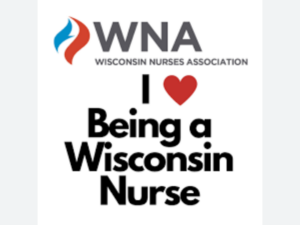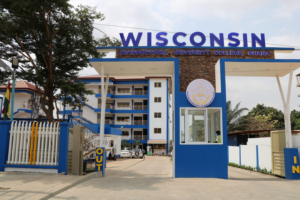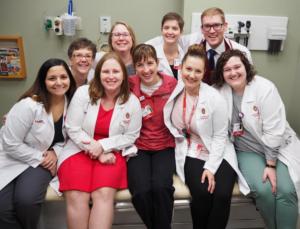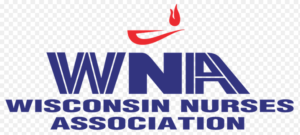Nursing In Wisconsin: Requirements, Licensing, and Salary Outlook
 In Wisconsin, the healthcare sector is growing rapidly, and nursing job opportunities in Wisconsin are expanding at a pace higher than the national average.
In Wisconsin, the healthcare sector is growing rapidly, and nursing job opportunities in Wisconsin are expanding at a pace higher than the national average.
This makes Wisconsin an attractive state for registered nurses (RNs).
Whether you are considering how to become a nurse in Wisconsin or looking for more information on nursing licensure in Wisconsin, this guide will provide all the essential details, from educational requirements to salary expectations.
As of 2020, nurses in Wisconsin earned a mean annual wage of $73,000, which is competitive compared to many states.
The state’s nursing workforce continues to grow as the demand for healthcare professionals rises across the state, especially in major cities like Milwaukee, Madison, and Green Bay. If you’re interested in becoming a registered nurse (RN) in Wisconsin, you’ll find that the state offers high-paying jobs, a variety of nursing degree programs, and favorable nursing licensure compact states opportunities for interstate practice.

Struggling to meet your deadline?
Get your assignment on Nursing In Wisconsin: Requirements, Licensing, and Salary Outlook done by certified MDs and PhDs in the USA. ORDER NOW!
Degree Requirements for Becoming a Registered Nurse in Wisconsin
To become an RN in Wisconsin, you must complete an accredited nursing degree program. Registered Nurse (RN) licensure requirements in Wisconsin specify that you can pursue either an Associate Degree in Nursing (ADN) or a Bachelor of Science in Nursing (BSN). Both degrees qualify you for RN licensure, but they come with different educational paths and career outcomes.
Associate Degree in Nursing (ADN) vs Bachelor of Science in Nursing (BSN)
- ADN Programs: ADN programs typically take two years to complete and are offered at community colleges. While ADN programs are faster and less expensive, they might limit your career options compared to a BSN. However, ADN programs are still a great option for those looking to get into the workforce quickly.
- BSN Programs: A BSN is a four-year degree that is increasingly preferred by employers in Wisconsin. With a BSN, you’ll have better job prospects, especially in specialized fields and management positions. Furthermore, many hospitals and healthcare systems in Wisconsin are Magnet hospitals, which often require a BSN for higher-level nursing roles.

Impact of ADN vs BSN on Career Opportunities in Wisconsin
Holding a BSN degree is especially advantageous in Wisconsin’s competitive nursing job market. Nurses with a BSN are more likely to qualify for leadership positions, advanced clinical roles, or nursing faculty positions. BSN nurses also earn higher salaries and have greater job stability due to the growing preference for BSN-educated nurses in Wisconsin’s hospitals and clinics.
How to Become a Nurse in Wisconsin
1. Apply to an ADN or BSN Program:
Choose an approved program to earn a two-year ADN or a four-year BSN degree. While ADN programs offer a quicker and more affordable route, BSN holders enjoy greater career flexibility.
2. Pass the NCLEX-RN:
Successfully complete the National Council Licensure Examination-Registered Nurse (NCLEX-RN) to meet the Wisconsin Board of Nursing’s requirements for RN licensure.
3. Apply for Jobs at Local Hospitals:
Wisconsin boasts a substantial nursing workforce, with 63,630 nurses employed in hospitals across the state. Explore opportunities in diverse healthcare settings.
4. Advance Your Career:
Consider pursuing a Master of Science in Nursing (MSN) for roles like nurse practitioner or administrator. Specialize further through certification programs or accelerated bridge programs.
5. Maintain and Renew Licensure:
Renew your Wisconsin RN license every two years by responding to the Nursing Workforce Survey, submitting an application, paying a $73 fee, and completing the renewal process by February 28 in even-numbered years.
Wisconsin Board of Nursing
The Wisconsin Board of Nursing oversees licensure applications and renewals, maintains a list of approved nursing schools, examines reported violations, and administers disciplinary actions. It also facilitates the Enhanced Nursing License Compact (NLC) and the Professional Assistance Procedure for nurses with substance abuse issues.
How to Get Your Nursing License in Wisconsin
Once you’ve completed your nursing degree, you will need to meet the Wisconsin RN licensure requirements to practice as a nurse in the state. Below are the steps to obtain your Wisconsin RN license:
Steps to Obtain a Wisconsin RN License
- Complete an Accredited Nursing Program: Whether you choose an ADN or a BSN program in Wisconsin, ensure that the program is accredited by the appropriate nursing body.
- Pass the NCLEX-RN: The NCLEX-RN is a national exam that all aspiring RNs must pass to become licensed in Wisconsin. This exam tests your knowledge and skills in nursing practices, patient care, and safety.
- Submit Your Application: After passing the NCLEX-RN, submit your application for a Wisconsin RN license to the Wisconsin Board of Nursing. You will need to provide documentation of your education and NCLEX-RN scores.
- Background Check: Wisconsin requires all applicants for RN licensure to undergo a background check as part of the application process.
- Pay Licensing Fees: The Wisconsin nursing license fees include an $88 initial license fee and $73 renewal fee every two years.
NCLEX-RN Exam Requirements for Wisconsin Nurses
To become a licensed RN in Wisconsin, you must successfully pass the NCLEX-RN. The exam is designed to test your competency in various aspects of nursing, including patient care, medication administration, and ethical practices.
Licensure for Nurses Moving to Wisconsin (Nursing Licensure Compact)
Wisconsin is part of the Nursing Licensure Compact (NLC), which allows nurses who hold a valid nursing license in another compact state to practice in Wisconsin without needing to obtain a new license. If you’re moving to Wisconsin from a non-compact state, you will need to apply for a Wisconsin RN license.
RN Licensure Eligibility Requirements in Wisconsin
To be eligible for nursing licensure in Wisconsin, candidates must:
- Hold a degree from an accredited nursing program.
- Have passed the NCLEX-RN exam.
- Complete a criminal background check.
- Submit verification of nursing practice if applying based on previous experience.

Salary and Employment Outlook for Nurses in Wisconsin
The nursing job market in Wisconsin is strong, and the demand for RNs is expected to increase. Registered nurse salaries in Wisconsin are competitive, with significant growth opportunities.
Average Salary for Registered Nurses in Wisconsin (2024)
The average salary for registered nurses in Wisconsin is about $74,760, with higher salaries in metropolitan areas such as Madison and Milwaukee. For example:
- Madison: $80,820
- Milwaukee: $75,980
- La Crosse: $74,680
Nursing Job Growth in Wisconsin
From 2018 to 2028, the state’s RN job growth is projected to increase by 7.8%, which is higher than the national average of 7%. This growth is due to the aging population and the expansion of healthcare services across the state.
Job Opportunities for Nurses in Wisconsin’s Metropolitan Areas
Major cities like Milwaukee, Madison, and Green Bay offer abundant nursing job opportunities. These cities have large hospitals and healthcare systems, including some of Wisconsin’s top-rated Magnet hospitals.
Top-Paying Metropolitan Areas for RNs in Wisconsin
Salary and Employment for Nurses in Wisconsin:
In Wisconsin, the median nursing salary is $74,760, slightly below the national median. With a lower cost of living, the state offers promising job growth rates, and only 1.3% of nurses are unemployed. Metropolitan areas like Madison, Milwaukee, and La Crosse exhibit higher median salaries, reflecting variations in living costs.
| Metropolitan Area | Median Salary |
|---|---|
| Madison | $80,820 |
| Milwaukee – Waukesha – West Allis | $75,980 |
| La Crosse – Onalaska | $74,680 |
| Racine | $71,760 |
| Oshkosh – Neenah | $71,380 |
Source: BLS
Best Hospitals to Work as a Nurse in Wisconsin
 Wisconsin is home to several highly regarded hospitals, many of which are recognized as Magnet hospitals. These hospitals provide excellent job opportunities for nurses in Wisconsin.
Wisconsin is home to several highly regarded hospitals, many of which are recognized as Magnet hospitals. These hospitals provide excellent job opportunities for nurses in Wisconsin.
Magnet Hospitals in Wisconsin
- UW Health (University of Wisconsin Hospitals) in Madison is recognized for its quality of care and nursing excellence. It earned Magnet status in 2009 and offers a supportive environment for nurses.
- Aurora St. Luke’s Medical Center in Milwaukee has been recognized as a Magnet hospital for five consecutive years.
- Froedtert & the Medical College of Wisconsin in Milwaukee is another Magnet facility offering exceptional career opportunities for RNs in Wisconsin.
Notable Wisconsin Hospitals for Nurses
- Bellin Memorial Hospital in Green Bay is an award-winning hospital that emphasizes quality patient care.
- Aurora Medical Center-Grafton is Wisconsin’s only green-certified hospital, making it an environmentally conscious choice for nurses.
How to Renew Your Nursing License in Wisconsin
Once you have obtained your Wisconsin RN license, you will need to keep it active through the license renewal process.
Wisconsin RN License Renewal Process
Your Wisconsin RN license renewal is required every two years, and the renewal fee is $73. The process involves completing a Nursing Workforce Survey and submitting your application by February 28th of even-numbered years. Continuing education is not required for renewal, but some employers may require professional development courses or certifications.
| Program Type | Institution |
|---|---|
Bachelor of Science |
|
Nursing Education Programs |
|
| Alverno College – Milwaukee | Alverno College |
| Bellin College – Green Bay | Bellin College |
| Carroll University – Waukesha | Carroll University |
| Carthage College – Kenosha | Carthage College |
| Concordia University Wisconsin – Mequon | Concordia University Wisconsin |
| Edgewood College – Madison | Edgewood College |
| Herzing University – Kenosha, Brookfield | Herzing University |
| Lac Courte Oreilles Ojibwa Community College | Lac Courte Oreilles Ojibwa Community College |
| Maranatha Baptist University | Maranatha Baptist University |
| Marian University – Fond du Lac | Marian University |
| Marquette University – Milwaukee | Marquette University |
| Milwaukee School of Engineering | Milwaukee School of Engineering |
| Mount Mary University | Mount Mary University |
| University of Wisconsin – Eau Claire | University of Wisconsin – Eau Claire |
| University of Wisconsin – Green Bay | University of Wisconsin – Green Bay |
| University of Wisconsin – Madison | University of Wisconsin – Madison |
| University of Wisconsin – Milwaukee | University of Wisconsin – Milwaukee |
| University of Wisconsin – Oshkosh | University of Wisconsin – Oshkosh |
| Viterbo University – LaCrosse | Viterbo University |
| Wisconsin Lutheran College | Wisconsin Lutheran College |
| Grand Canyon College of Nursing | Grand Canyon University |
Bachelor of Science – Accelerated Programs |
|
| Alverno College’s 18-month BSN Completion program | Alverno College |
| Concordia University Wisconsin – Mequon | Concordia University Wisconsin |
| Edgewood College – Madison | Edgewood College |
| Herzing University – Kenosha, Brookfield, Madison | Herzing University |
| MSOE School of Nursing | Milwaukee School of Engineering |
| University of Wisconsin – Madison | University of Wisconsin – Madison |
| University of Wisconsin-Oshkosh | University of Wisconsin – Oshkosh |
Wisconsin Technical Colleges with Articulation Agreements |
|
| Western – LaCrosse | Western Technical College |
Associate Degree Programs |
|
| Bryant & Stratton College | Bryant & Stratton College |
| Carroll University – Waukesha | Carroll University |
| Herzing University – Madison | Herzing University |
Wisconsin Technical College System Schools |
|
| Blackhawk – Janesville | Blackhawk Technical College |
| Fox Valley – Appleton | Fox Valley Technical College |
| Gateway – Kenosha | Gateway Technical College |
| Lakeshore – Cleveland | Lakeshore Technical College |
| Madison Area – Madison, LPN | Madison Area Technical College |
| Mid-State – Wisconsin Rapids | Mid-State Technical College |
| Milwaukee Area – Milwaukee | Milwaukee Area Technical College |
| Moraine Park – West Bend | Moraine Park Technical College |
| Nicolet Area – Rhinelander | Nicolet Area Technical College |
| Northcentral – Wausau | Northcentral Technical College |
| Northeast Wisconsin – Green Bay | Northeast Wisconsin Technical College |
| Southwest Wisconsin – Fennimore | Southwest Wisconsin Technical College |
| Western – LaCrosse | Western Technical College |
| Northwood Technical – Shell Lake | Northwood Technical College |
Master of Science Degree Programs |
|
| Alverno College – Milwaukee | Alverno College |
| Bellin College – Green Bay | Bellin College |
| Carroll University – Waukesha | Carroll University |
| Concordia University Wisconsin – Mequon | Concordia University Wisconsin |
| Edgewood College – Madison | Edgewood College |
| Herzing University | Herzing University |
| Marian University – Fond du Lac | Marian University |
| Marquette University – Milwaukee | Marquette University |
| MSOE School of Nursing | Milwaukee School of Engineering |
| University of Wisconsin – Green Bay | University of Wisconsin – Green Bay |
| University of Wisconsin – Eau Claire | University of Wisconsin – Eau Claire |
| University of Wisconsin – Milwaukee | University of Wisconsin – Milwaukee |
| University of Wisconsin – Oshkosh | University of Wisconsin – Oshkosh |
Doctoral Programs |
 |
PhD Programs |
|
| University of Wisconsin – Madison | University of Wisconsin – Madison |
| University of Wisconsin – Milwaukee | University of Wisconsin – Milwaukee |
| Marquette University – Milwaukee | Marquette University |
Doctor of Nursing Practice (DNP) Programs |
|
| Bellin College – Green Bay | Bellin College |
| Marquette University – Milwaukee | Marquette University |
| Edgewood College – Madison | Edgewood College |
| University of Wisconsin – Eau Claire | University of Wisconsin – Eau Claire |
| University of Wisconsin – Madison | University of Wisconsin – Madison |
| University of Wisconsin – Milwaukee | University of Wisconsin – Milwaukee |
| University of Wisconsin – Oshkosh | University of Wisconsin – Oshkosh |
| Viterbo University – LaCrosse | Viterbo University |
Licensed Practical Nurse Programs |
|
Wisconsin Technical College System Schools |
|
| Fox Valley – Appleton | Fox Valley Technical College |
| Lakeshore Technical College – Cleveland | Lakeshore Technical College |
| Madison Area – Madison | Madison Area Technical College |
| Milwaukee Area – Milwaukee | Milwaukee Area Technical College |
| Moraine Park – West Bend | Moraine Park Technical College |
| Northeast Wisconsin – Green Bay | Northeast Wisconsin Technical College |
| Diploma in Practical Nursing – Madison | Madison College |
Resources for Nurses in Wisconsin
Wisconsin Nurses Association
As the state’s largest professional association for nurses, WNA offers continuing education, advocacy, conferences, practice statements, and job listings. Membership includes American Nursing Association membership.
Wisconsin Association of School Nurses
Affiliated with the National Association of School Nurses, WASN provides joint membership, continuing education, data on school nursing, and an annual conference with exclusive scholarship opportunities.
Wisconsin Professional Homecare Providers
This association supports independent practice for Wisconsin RNs and LPNs, providing education and networking opportunities for respiratory care service providers and private duty nursing providers.
Frequently Asked Questions about Nursing in Wisconsin
How to Become an RN in Wisconsin?
 To become an RN in Wisconsin, you need to:
To become an RN in Wisconsin, you need to:
- Complete an accredited ADN or BSN program.
- Pass the NCLEX-RN exam.
- Apply for licensure through the Wisconsin Board of Nursing.
How Long Does it Take to Get RN Licensure in Wisconsin?
It typically takes two years to complete an ADN or four years for a BSN. Many nurses choose to complete a bridge program if they already hold a degree in another field.
What States Can I Work in with a Wisconsin Nursing License?
As Wisconsin is a member of the Nursing Licensure Compact (NLC), nurses licensed in Wisconsin can practice in other compact states without needing to apply for a separate license.
How Much is a Wisconsin Nursing License?
The Wisconsin nursing license costs $88 for the initial application and $73 for renewals every two years.

Dont wait until the last minute.
Provide your requirements and let our native nursing writers deliver your assignments ASAP.

